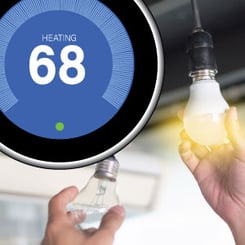
Energy efficiency reduces wasted energy consumption by incorporating new efficient technologies. Incorporating energy efficiency in our homes is an important part of reducing Eagle County’s greenhouse gas emissions, which contribute to climate change. This moves our community closer to the goals of Eagle County’s Climate Action Plan, reducing greenhouse gas emissions by 25% by 2025 and 80% by 2050, because energy efficiency reduces the amount of electricity and natural gas needed to power a building. Both natural gas and electricity produced with fossil fuels contribute to greenhouse gas emissions.
In order to meet our climate action goals, our community needs to transition away from both the fossil fuel electricity and natural gas currently powering most homes. In addition to reducing the amount of energy needed to power a home, energy efficiency is playing a key role in our transition to cleaner energy. Electricity produced with solar panels has continued to reduce in price, becoming competitive with fossil fuel electricity. Solar is predicted to supply more of our electricity every year. Pairing this increase in solar with energy efficiency means that solar power will be able to supply our electricity faster because less electricity needs to be produced. In addition, clean energy, like what is produced by solar and other renewable energy sources, releases no greenhouse gas emissions during production or consumption. This would put our residential building sector halfway towards its goal of zero greenhouse gas emissions by 2050.
Addressing the use of natural gas is the other piece needed to get our homes to zero greenhouse gas emissions. Unlike electricity, natural gas cannot come from a cleaner, zero emissions source. Energy efficiency can reduce our consumption of natural gas; and therefore, the emissions that come from it. For many homes natural gas is their only fuel source for heat and can only be reduced to a certain point.
To stop relying on natural gas completely, we will need to convert our homes’ heating systems to electricity in a process called electrification. Electric heating systems have been around for many years, but until recently there were concerns about the efficiency of the technology, especially in cold climates like Eagle County’s that rely heavily on heating homes. Electric heat has also commonly been more expensive than natural gas heat. Luckily, our technology is always improving in energy efficiency, which has brought us an electric heating system called a cold climate air source heat pump. Cold climate air source heat pumps (ccASHP) are designed for cold climates and are 50% more energy efficient than electric resistance heat, including electric furnaces and electric baseboard heaters. Therefore, we can now electrify our community with only half the energy and at a lower cost!
All of the pieces to achieving our residential sector climate action goals are already available, and energy efficiency has played an important role in creating all of those pieces. We now need to continue to implement these steps in our community and in our own homes. Fortunately, there are lots of local opportunities for coaching and financial assistance to get us there.
How to pursue energy efficiency and our climate action goals today?
- Schedule a home energy assessment through Energy Smart Colorado at Walking Mountains. You’ll receive a customized report that outlines energy efficiency improvements for your home.
- Consider energy efficiency upgrades that you can do yourself.
- Upgrade all of your lightbulbs to energy efficient LEDs.
- Use your programmable thermostat to lower your heat when you aren’t home.
- Lower your hot water temperature to 120F.
- Use Energy Smart Colorado at Walking Mountain’s rebate program to help you afford larger energy efficiency upgrades, including cold climate air source heat pumps and other projects recommended by your home energy assessment report.
Take action today - contact Walking Mountains Sustainability to determine your next steps!
References
https://www.energy.gov/energysaver/home-heating-systems/electric-resistance-heating
https://www.mncee.org/blog/july-2018-(1)/cold-climate-air-source-heat-pumps/
https://www.energysmartcolorado.com/







